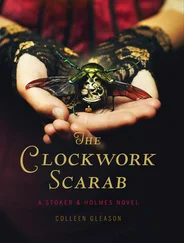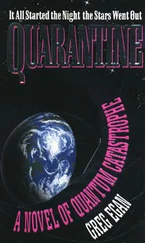Greg Egan - The Clockwork Rocket
Здесь есть возможность читать онлайн «Greg Egan - The Clockwork Rocket» весь текст электронной книги совершенно бесплатно (целиком полную версию без сокращений). В некоторых случаях можно слушать аудио, скачать через торрент в формате fb2 и присутствует краткое содержание. Жанр: Фантастика и фэнтези, на английском языке. Описание произведения, (предисловие) а так же отзывы посетителей доступны на портале библиотеки ЛибКат.
- Название:The Clockwork Rocket
- Автор:
- Жанр:
- Год:неизвестен
- ISBN:нет данных
- Рейтинг книги:3 / 5. Голосов: 1
-
Избранное:Добавить в избранное
- Отзывы:
-
Ваша оценка:
- 60
- 1
- 2
- 3
- 4
- 5
The Clockwork Rocket: краткое содержание, описание и аннотация
Предлагаем к чтению аннотацию, описание, краткое содержание или предисловие (зависит от того, что написал сам автор книги «The Clockwork Rocket»). Если вы не нашли необходимую информацию о книге — напишите в комментариях, мы постараемся отыскать её.
The Clockwork Rocket — читать онлайн бесплатно полную книгу (весь текст) целиком
Ниже представлен текст книги, разбитый по страницам. Система сохранения места последней прочитанной страницы, позволяет с удобством читать онлайн бесплатно книгу «The Clockwork Rocket», без необходимости каждый раз заново искать на чём Вы остановились. Поставьте закладку, и сможете в любой момент перейти на страницу, на которой закончили чтение.
Интервал:
Закладка:
Yalda said, “If everything in this room has a negative temperature, where are the positive ones?”
“On the surface of the sun,” Cornelio replied. “In our own burning stones.”
“I see.” A burning stone heated its surroundings, adding kinetic energy to them, so true energy would have to be flowing the other way, into the flame. Did that make sense? Cornelio had warned her that energy only flowed from the higher temperature to the lower if both had the same sign.
The mixed-sign case wasn’t hard to understand, though. A system with a positive temperature would gain possibilities if it gained energy. A system with a negative temperature would gain possibilities if it lost energy. Putting the two together, there was no subtle trade-off anymore—this was a win-win situation. Both systems could gain volume in momentum space from the same transaction.
So, any system with a negative temperature would lose true energy to any system with a positive temperature. That was why Cornelio had seen merit in calling ordinary objects “hotter than infinitely hot”; however high the positive temperature of a blazing sunstone, a “hotter than infinitely hot” cool breeze could still heap true energy upon it.
Yalda said, “But how can you know for sure that something has a positive temperature—and not just a large negative one? How do you know when things aren’t just ‘hot’ in the old-fashioned way?”
“Light,” Cornelio replied. “Whenever a system freely creates light—not in the orderly way a flower does it, but in the chaos of a flame—it’s turning true energy into something that didn’t exist before, opening up new possibilities. That’s the very definition of positive temperature.”
“So once an ordinary system with a negative temperature starts creating light,” Yalda ventured, “its temperature must change sign? Crossing infinity along the way?”
“Precisely,” Cornelio said. “Once it’s creating light, it’s lost to the ordinary world.”
Yalda couldn’t help stealing another glance at the workshop’s collection of energetically precarious concoctions. Above the shelves, the ceiling still showed signs of recent repairs.
“In the end,” Cornelio declared, “everything becomes heat and light. It’s not in our power to stop that. All we can do is slow it down a little and try to enjoy the ride.”
Yalda ended up staying in the chemistry department until dusk, then she caught a lift in the department’s truck back to the city campus, along with Cornelio and five of his students. As they drove across the dusty plain, Cornelio explained how the pressure of a gas could remain positive as its temperature changed sign, and finite as its temperature crossed infinity. The old ideal gas law— pressure times volume is proportional to temperature times quantity —was receding into the distance; it wasn’t even true within the flames of an ordinary lamp.
The back of the truck was open to the sky, so Yalda saw the Hurtler’s violet tip rushing toward them from the north, but then the driver panicked and slammed on the brakes, sending the vehicle lurching and skidding. When it came to a halt she could recall nothing but a whirl of color across a spinning bowl of stars.
Everyone clambered out, checking themselves for injuries, but it was soon clear that nobody had been hurt. Yalda was still clutching her light recording supplies; she examined the contents of the box in the starlight, but Cornelio had packed everything carefully and none of the vials appeared to have been damaged. She helped some of the students push the truck back onto the road, wasting no time fretting over the lost opportunity. At this rate, there’d be another Hurtler over Zeugma in a couple of stints.
“What do you think they are?” she asked Cornelio, as the truck lurched into motion again.
“Fragments from a big explosion,” he replied. “Something so distant that even the smallest differences in the speed of the debris could spread out its arrival over many years. My hunch is that successively later fragments will prove to be moving more slowly.”
“That’s an interesting idea.” Yalda tapped the box of goodies appreciatively. “Hopefully I’ll be able to test it soon.” A crisp image of a Hurtler’s light trail, captured at a single moment, might enable her to measure its asymmetry and finally quantify the object’s speed.
It was dark when they reached the city. At the university, Yalda bid farewell to Cornelio, stashed her new supplies in the optics workshop, then braved Ludovico’s wing of the department to see if Tullia was still around. But the place was empty. Tullia might have caught some observations of the Hurtler, then, on her way to her apartment or the Solo Club.
At the Solo, Yalda found Daria and Lidia; they hadn’t seen Tullia, but they persuaded Yalda to join them in a game of six-dice. To everyone’s amazement, Yalda won, so she stayed for a second game. Lidia beat her this time, but it was close.
Yalda was tired now, but she decided it was worth stopping by at Tullia’s apartment; it would be good to share the highlights of her trip to Amputation Alley. Tullia was planning to head up to Mount Peerless in a few stints; she could probably make use of Cornelio’s invention there herself.
When she arrived at the apartment, Yalda found the entrance unbarred but the curtain closed. She called out softly a few times, but received no reply. Tullia didn’t usually sleep so early, but if she’d dozed off after a hard day it would be unfair to wake her.
Yalda turned and started toward the stairs, but then she changed her mind; it wouldn’t hurt to sneak in quietly and check that everything was all right. She walked back, parted the curtain and stepped into the apartment.
Tullia was lying on the floor near the window. Yalda called her name but there was no response. She approached and knelt to examine her; Tullia was limbless, and her skin displayed a strange sheen. For one panicked moment Yalda thought of her grandfather, but then she realized that the patches of light she was seeing were just distorted reflections of the flowers above.
Yalda took her friend by the shoulders and shook her gently; her skin felt strange—tight, almost rigid—and she did not react at all. There was a furrow down the middle of her chest: a deep, narrow fissure, the first line of a symbol that Tullia would never have written by choice.
“No,” Yalda whispered. “That’s not happening.” She scrabbled in her pocket for her vial of holin. If Tullia had taken a weak dose, it might not be too late to augment it. Yalda tipped three of the small green cubes into her palm, then reached for Tullia’s mouth.
But Tullia had no mouth. The darker pigmentation of her lips remained visible, but the skin that bore their color and shape was part of a smooth, seamless expanse. Yalda dropped the holin and moved her fingers over Tullia’s face, gently probing one of her eyes; the eyelids were still discernible, but they’d fused together. Below her mouth, her tympanum was rigid. Her body was becoming as hard and featureless as a seed case.
Yalda was shaking now; she forced herself to be still. Who would know what to do? Daria, surely. Yalda leaned out the window and spotted a boy on the street; she threw him a coin to get his attention, then begged him to run to the restaurant under the Solo and ask the chef to “fetch Daria, urgently, for Yalda”. Two more pieces and the promise of two more on his return did the trick.
As Yalda knelt down again, her shadow fell on Tullia and she saw that there was a faint glow from her body—though it was not on the surface, like her grandfather’s affliction. This light came from deep within, and it flickered and shifted constantly: a frenzy of signaling so intense that it could now be seen through all the intervening flesh.
Читать дальшеИнтервал:
Закладка:
Похожие книги на «The Clockwork Rocket»
Представляем Вашему вниманию похожие книги на «The Clockwork Rocket» списком для выбора. Мы отобрали схожую по названию и смыслу литературу в надежде предоставить читателям больше вариантов отыскать новые, интересные, ещё непрочитанные произведения.
Обсуждение, отзывы о книге «The Clockwork Rocket» и просто собственные мнения читателей. Оставьте ваши комментарии, напишите, что Вы думаете о произведении, его смысле или главных героях. Укажите что конкретно понравилось, а что нет, и почему Вы так считаете.










